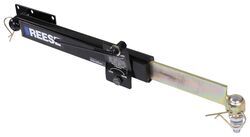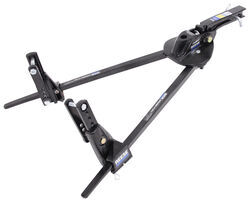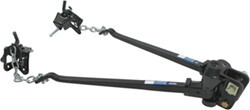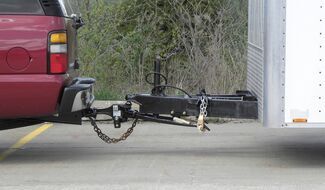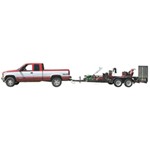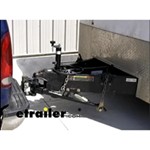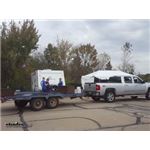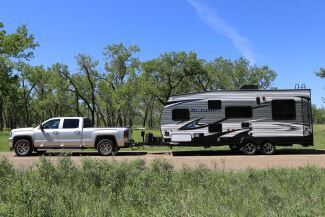
Best Weight Distribution and Sway Control Option for 1998 Durango
Question:
1998 Dodge Durango 5.2L V-8 Has factory tow package assuming Class IV, per Dodge info I researched has max tow capacity of 5600 lbs Towing 16ft Overdeck dual axle trailer with Cargo Box mounted on tongue Hauling 4 ATVs: Yamaha Rhino: 1049 lbs dry weight Polaris Scrambler: 523 lbs dry weight Honda Recon: 414 lbs dry weight Mini 110cc: 190 lbs dry Weight TOTAL MACHINE WEIGHT: Approx 2200 lbs Occassionally haul camping gear in back of truck and on trailer adding additional weight On the trailer, I load the Scrambler 523 lbs and Recon 414 lbs on front closest tongue Mini 110cc 190 lbs goes sideways behind Recon Rhino 1049 lbs gets centered on trailer behind 3 other bikes, with engine block pretty much centered over the dual trailer axles. Based on how the machines are loaded on trailer, I think I have distributed the weight on the trailer best I can, but I get alot of sway with just the ATVs on the trailer or with the ATVs and camping gear. With only ATVs, I get a little sag in rear end of truck, with ATVs and camping gear, a little more sag. Keep in mind the weights provided for the ATVs are dry weights machines are always full of gas when hauling on trailer, so not sure how much weight this adds. I am trying to find the best solution to eliminate sway and have better weight distribution, but I dont know if Independent Friction Control, Dependent Sway Control, or Active Sway Control is my best bet. I also dont have an idea of what my tongue weight is based on how I load my machines and other gear. Based on my limited knowledge and research, I am guessing a WD system with TW of 400-800 lbs would be ideal for me, with TW of 200-600 lbs being too small? For sway control, the Independent Friction doesnt appeal to me as it appears to only start working AFTER sway has started and I would rather invest a little extra money into something that PREVENTS the sway from happening. This narrows my choices down to Dependent Sway Control or Active Sway Control. I am not sure if Active Sway Control is overkill for what I am trying to do, so I need some direction from your experts. I shopped a few local trailer stores one told me I just needed to install some airbags on the rear of the vehicle to tighten up the rear suspension, but I dont see how that fixes my sway problem. The other place I went to suggested a WD and sway control system, but didnt really help me with the different types of sway control options, but the kit they recommended was anywhere from $600-$700.
asked by: Mike B
Expert Reply:
Typically, we figure trailer tongue weight as being from 10 to 15 percent of the weight of the fully loaded trailer. You have provided me with the weight of the items placed on the trailer, but not the weight of the trailer itself. When figuring tongue weight, the weight of any items placed behind the rear axle in the tow vehicle must be considered as well.
We have an online page that shows how to determine the tongue weight of the trailer using a length of pipe, some scrap lumber and a bathroom scale. You might find this information helpful. I will provide a link below to this information.
Your first step would be to determine the tongue weight of your trailer and the total weight, when loaded and ready to tow. The weight of anythig carried in the cargo area or bed of the tow vehicle behind its rear axle also needs to be included in this figure. With this information you can determine if the tongue weight is light, the biggest cause for trailer sway, or if the trailer is loaded properly and a weight distribution system is needed.
If your tongue weight is too low, your solution may be as simple as redistributing the weight on the trailer to add a bit more tongue weight, and the sway may be eliminated altogether.
If you determine that you need sway control or the added tongue weight causes the back of your vehicle to sag unacceptably, you should consider a weight distribution and sway control system. When choosing a sway control system, we have several options. It is kind of a good, better, best type of proposition.
The Friction type sway control, like part # 83660 is a good option for minor sway problems. The next step up would be the dependent type sway control system that's combined with a weight distribution system, as seen with the Reese Steadi-flex part # RP66559 which is designed for trailers with a 500-1000 lb tongue weight. The most effective anti-sway option would be the Strait-Line Hitch, such as part # RP66073, designed for trailers with 400-800 lb tongue weights. The Strait-Line is a combination of the High Performance Trunnion Bar Weight Distribution System and the Dual Cam Sway Control System. The Dual Cam System is the top of the line in sway control, it will stop trailer sway in its tracks before it can occur.
If you would care to respond with your trailer weight, I can make some more specific recommendations for you.

Products Referenced in This Question
Reese Friction Sway Control Kit - Economy - by Draw-Tite, Reese and Hidden Hitch
- Accessories and Parts
- Weight Distribution Hitch
- Sway Control Parts
- Reese
more information >
Reese Steadi-Flex Weight Distribution System w/ Sway Control - Trunnion - 10K GTW, 1K TW
- Weight Distribution Hitch
- WD With Sway Control
- Some Sway
- Includes Shank
- Electric Brake Compatible
- Surge Brake Compatible
- Fits 2 Inch Hitch
- Allows Backing Up
- 600 lbs
- 700 lbs
- 800 lbs
- 900 lbs
- Reese
more information >
Product Page this Question was Asked From
Strait-Line Weight Distribution w/ Sway Control - No Shank - Trunnion Bar - 6K GTW, 600 lbs TW
- Weight Distribution Hitch
- WD With Sway Control
- Some Sway
- Shank Not Included
- Electric Brake Compatible
- Fits 2 Inch Hitch
- Fits 2-1/2 Inch Hitch
- Allows Backing Up
- 300 lbs
- 400 lbs
- 500 lbs
- Reese
more information >
Featured Help Information
Instructions
Miscellaneous Media

Continue Researching
- Shop: Reese Steadi-Flex Weight Distribution System w/ Sway Control - Trunnion - 10K GTW, 1K TW
- Shop: Curt TruTrack Weight Distribution System w/ Sway Control - Trunnion - 8,000 lbs GTW, 800 lbs TW
- Q&A: Will The Reese Dual Cam II Weight Distribution System # RP65FR Fit 2023 GD Imagine XLS 22RBE?
- Video: Curt Weight Distribution - WD With Sway Control - C17499 Review
- Video: Reese Steadi-Flex Weight Distribution System with Sway Control Review
- Video: Reese Weight Distribution - WD With Sway Control - RP66559 Review
- Video: Equal-i-zer Weight Distribution - WD With Sway Control - EQ37120ET Review
- Shop: Reese Dual Cam High-Performance Sway Control for Steel Trailer Frames
- Shop: Strait-Line Weight Distribution System w/ Sway Control - Trunnion Bar - 12,000 lbs GTW, 1,200 lbs TW
- Shop: Reese Dual Cam II Weight Distribution System w/ Active Sway Control - No Shank - 8K GTW - 800 TW
- Shop: Equal-i-zer Weight Distribution System w/ 4-Point Sway Control - 12,000 lbs GTW, 1,200 lbs TW
- Shop: Strait-Line Weight Distribution System w Sway Control - Round Bar - 10,000 lbs GTW, 800 lbs TW
- Q&A: Can Any Shank Be Used With the Strait-Line Weight Distribution System
- Q&A: Were Cams of Reese Dual Cam III Upgraded from Previous Version
- Q&A: Recommended Weight Distribution System for 2004 Chevy Avalanche Towing 4000 lb Trailer
- Article: 5 Things to Know About Weight Distribution Hitches
- Search Results: weight distribution hitch
- Q&A: What is the Difference Between a Class II and a Class III Hitch?
- Shop: Trailer Hitch
- Shop: Brake Controller
- Search Results: weight distribution sway control
- Article: 2 Steps for Finding the Right Weight Distribution Hitch Size
- Video: Review of Reese Weight Distribution - WD Only - RE44FR
- Q&A: What is the Difference Between a 4-Way and 7-Way Trailer Connector
- Article: Determining Trailer Tongue Weight
- Shop: Suspension Enhancement
- Video: Review of Reese Weight Distribution Hitch - 6K WD With Sway Control - RE34FR
- Search Results: backup camera systems
- Video: Choosing the Right Brake Controller
- Search Results: sway control



